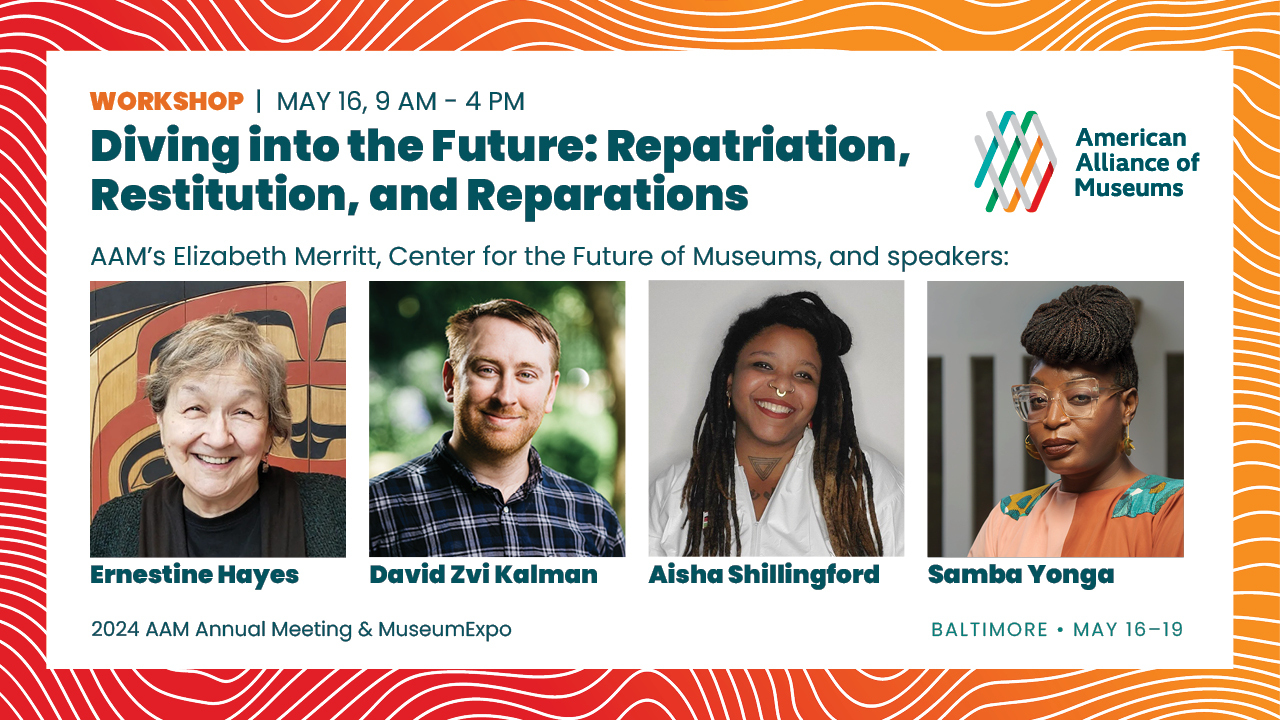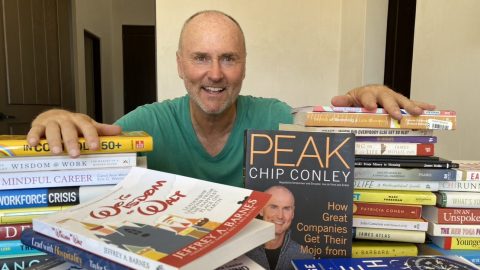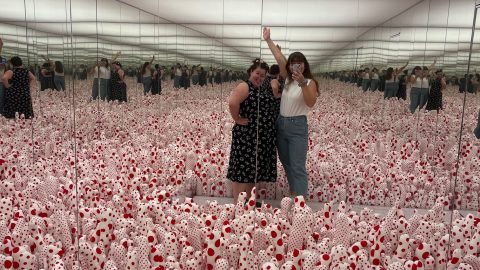
It’s 2044, and around the nation, and throughout the world, US museums are seen as valued stewards and honored partners in the critical work of supporting communities and preserving cultural heritage. In that future, we’ve worked through our struggles over voluntary repatriation, restitution, and reparations. Museums have helped society repair the damage inflicted by colonial practice, slavery, war, and oppression.
Does this version of the future sound good to you? Would you like to know what steps we can take now to make it come true? Then join me on Thursday, May 16, at the AAM Annual Meeting in Baltimore, for an all-day deep dive into envisioning this and other “better futures.”
Each year I teach a foresight workshop at the Annual Meeting, and each year it has sold out, with people standing by the door, on the day of, hoping to snag an empty spot. This year is going to be the best experience yet, a full-day crash course into how to bring potential futures to life, with new interactives to add to your foresight toolkit and an amazing roster of guest speakers engaging with attendees around their visions for the next horizon of museum practice. Ticket sales for this event will close April 26—learn below how to include it with your AAM 2024 registration.
In addition to teaching general foresight skills you can apply in planning, this year the workshop has a topical theme as well: creating a future of reparative practice, in which museums have healthy, supportive relationships with descendant communities. We’ll consider specific communities (people harmed by violence and theft in the Nazi era; communities in sub-Saharan Africa; Indigenous Peoples of the Pacific and the Americas; and descendants of people who were enslaved in what is now the USA) to ground an exploration of process and issues that are broadly applicable to questions of museums, collections, and ethical practice.
Who should come?
- People who want to add foresight tools to their repertoire as a museum leader, staff member, independent consultant, or changemaker.
- Museum people striving to create ethical practices around issues of collections stewardship, including voluntary repatriation, restitution, and reparative practice.
- People interested in adding the skills of “design fiction” to their own creative practice.
I’ll kick off the program with my pitch for why it is so important, and powerful, to ground your work in a clear, compelling vision of the future you want to create, and introduce attendees to a foresight framework designed to support that process.
Then we’ll alternate, throughout the day, between practical, replicable exercises you can apply to your own museum’s foresight and planning, and inspirational interactions with four amazing authors developing their own visions of preferred futures for a collection of papers to be published by CFM later this year. These people are fabulous, and I am thrilled to bring them to the Annual Meeting to work with our attendees!
Here’s who will take the stage to share their thoughts about the future. (I’ve added my own, unofficial mash notes after their bios.)
Ernestine Hayes, belongs to the Wolf House of the Kaagwaantaan clan of the Tlingit nation. She has gratefully received recognition from Rasmuson Foundation, United States Artists, First Nations Development Institute and Henry Luce Foundation, Alaska State Council on the Arts, and Before Columbus Foundation. Author of Blonde Indian, an Alaska Native Memoir and The Tao of Raven, an Alaska Native Memoir, Hayes makes her home in Juneau. (Ernestine was Alaska’s State Writer Laureate from 2016 to 2018, and her prose is transcendent—perhaps she will sign your copy of Blonde Indian or The Tao of the Raven if you bring it along. Ernestine introduces herself in this seven-minute video from the Rasmuson Foundation.)
David Zvi Kalman, Research Fellow, Shalom Hartman Institute, is a writer working at the intersection of technology, religion, and art. He is the owner of Print-O-Craft Press, an independent publishing house that focuses on Jewish art books and LGBTQ subjects. David Zvi holds a PhD from the University of Pennsylvania and a BA from the University of Toronto. He is the inventor of the twenty-sided dreidel, his short fiction has appeared in multiple locations, and he blogs at the website Jello Menorah. (In his work, David Zvi explores an amazing range of contemporary issue from the place of transgender identity in Jewish history, to how Jewish values might guide our response to the threats and promise of artificial intelligence. I’m a fan.)
Aisha Shillingford, (she/her), is an anti-disciplinary artist, world builder, and experience designer originally from Trinidad & Tobago. She is the Artistic Director of Intelligent Mischief, a creative studio using art, storytelling, and immersive experiences to unleash the power of Black radical imagination to shape the future. Her mixed media collages, text-based work, street art, murals, installation, and experiential design work reflect Black utopias, abolition, Black radical imagination, solidarity economics, climate futures, marronage, and dreamspace. She draws on recurring themes and symbols of fugitivity, opacity, and afrosurrealism. She has been an Artist in Residence within Laundromat Project’s Creative Change Program, a mentor at the New Museum Incubator, and a Project Fellow at NYU Tisch Interactive Technology Program. She is committed to creating art, spaces, and experiences that inspire Black folks to imagine and co-create beautiful futures together. (Aisha is now one of my inspirations for futuring! For an introduction to her approach read this article: Murmurations: Black Imagination Can Build a Better World.)
Samba Yonga is an award-winning journalist, communications specialist, and cultural curator based in Lusaka, Zambia. She is co-founder of the Women’s History Museum of Zambia, established in 2017 with the mandate to research and restore African indigenous narratives, knowledge, and ‘living histories’ focused on women. She has curated exhibitions, designed digital creative content, and written papers focused on indigenous African knowledge systems and narratives in Zambia and Africa. She is a Yale University Fellow for the Institute of Preservation of Cultural Heritage. Samba has been recognised as 100 most influential Africans by Quartz, New York, and one of 40 most influential Africans. She is also a Google Podcast Creator, TEDx Lusaka speaker, and is a Museum Lab Fellow for 2022, Yale Director’s Forum Africa Fellow 2024. (If you need 10 minutes of inspiration this week, I highly recommend watching Samba’s TEDx talk, The Blueprint for an African Superhero Curriculum.)
I hope you will come future with me, Samba, Ernestine, David Zvi, and Aisha at AAM 2024. You can buy a ticket when you register for the meeting ($75 covers a box lunch and morning and afternoon snacks).
If you have already registered and would like to add event tickets to your existing registration, follow these steps:
- Log into the Attendee Service Center.
- From the top menu, select the Service Centers dropdown and choose “Purchase Event Tickets” under Attendee Service Center.
- Click on the Edit link next to your profile name. You will see your completed AAM 2024 registration form.
- Scroll to the end of your attendee information on page 1 and select “Continue,” and do the same on page 2 and click “continue.”
- On the “Add-On Items” page there will be listings of educational and event tickets available for purchase. Make your selection(s) by clicking in the checkbox next to the ticketed event(s) you would like to purchase and select “Continue.”
- On the review page, select “Continue” to submit your payment and complete the event ticket purchase process.
(If you have any questions, please contact annualmeeting@aam-us.org.)
Warmest regards from the future,
Elizabeth
Elizabeth Merritt
Vice President, Strategic Foresight and Founding Director, Center for the Future of Museums








